Essentials of Oil and Gas Course
Introduction:
Oil and gas are crucial to global business operations, encompassing a comprehensive process from exploration and production to refining and distribution. This Essentials of Oil and Gas course provides foundational knowledge across all stages of oil and gas operations, from preparation to decommissioning.
Participants will explore industry dynamics, including international pricing competition, maintenance of aging facilities, and the importance of safe and environmentally responsible practices. The course aims to equip the next generation of oil and gas operators with the expertise needed to advance the industry amid personnel transitions and globalization.
Objectives:
Upon completing the Essentials of Oil and Gas Course, participants will be able to:
- Assess the phases of the oil and gas life cycle, including upstream, midstream, and downstream sectors.
- Explain the origin, formation, distribution, recovery, and processing systems of oil and gas.
- Understand industry-specific terminology and the requirements for land and sea production installations.
- Recognize the complexities of oil and gas production and identify innovative practices for effective management.
- Appreciate the high-risk nature of the industry and the significance of safety training in maintaining operational integrity and environmental compliance.
Training Methodology:
- Interactive presentations
- Professional experience
- Hands-on activities
- Teamwork
- Equipment usage
- Oral problem-solving
- Workshops
Course Outline:
Unit 1: Introduction to Oil and Gas and The Industry
- Overview of the sector’s timeline
- Onshore and offshore operations
- International oil and gas industry demand, supply, and pricing
- Types of oil and gas
- Hydrocarbon substances’ structure and properties
- Sources of oil and natural gas
- Underground movement of oil and natural gas
- Petroleum reservoir processes
- Reservoirs
Unit 2: Upstream Production and Equipment
- Onshore and offshore oil and gas production processes
- Equipment used in production and its effectiveness
Unit 3: Risks and Upstream Exploration Activities
- Health, safety, and environmental priorities in oil and gas safety
- Security
- Quality management
- Environmental management
- Risk management in exploration
- Obtaining drilling rights
Unit 4: Oil and Gas Drilling
- Exploration drills
- Bottom-supported units
- Floating systems
- Land rigs
- Drilling equipment and processes
- Drill bits, drilling fluid, and circulation systems
- Drawworks and rotary systems
- Electrical and lifting systems
- Drilling team roles and equipment selection
- Bottom-supported and floating drilling units
- Drilling costs and abandonment
- Offshore and land drilling rigs
- Vertical and lateral drilling
- Workover
Unit 5: Midstream, Downstream, and Decommissioning
- Processing flags
- Storage importance
- Fuel transportation
- Refinery industry
- Non-conventional theories
- Dismantling


















